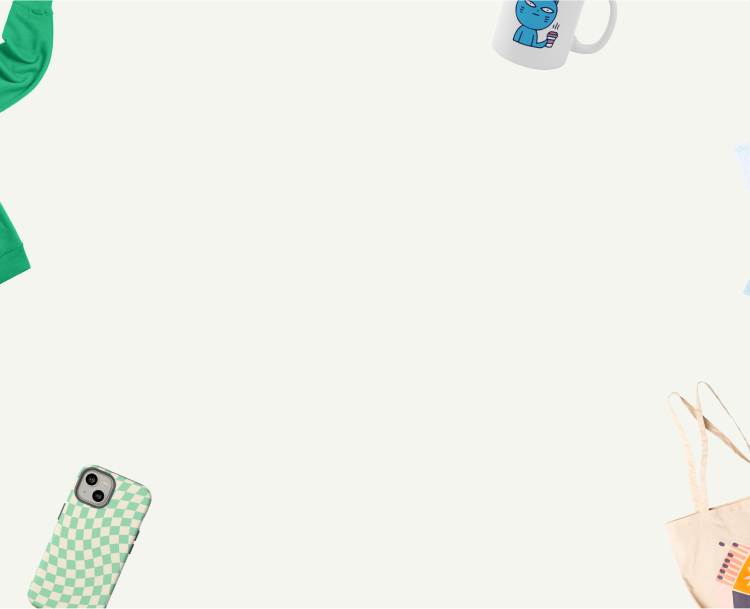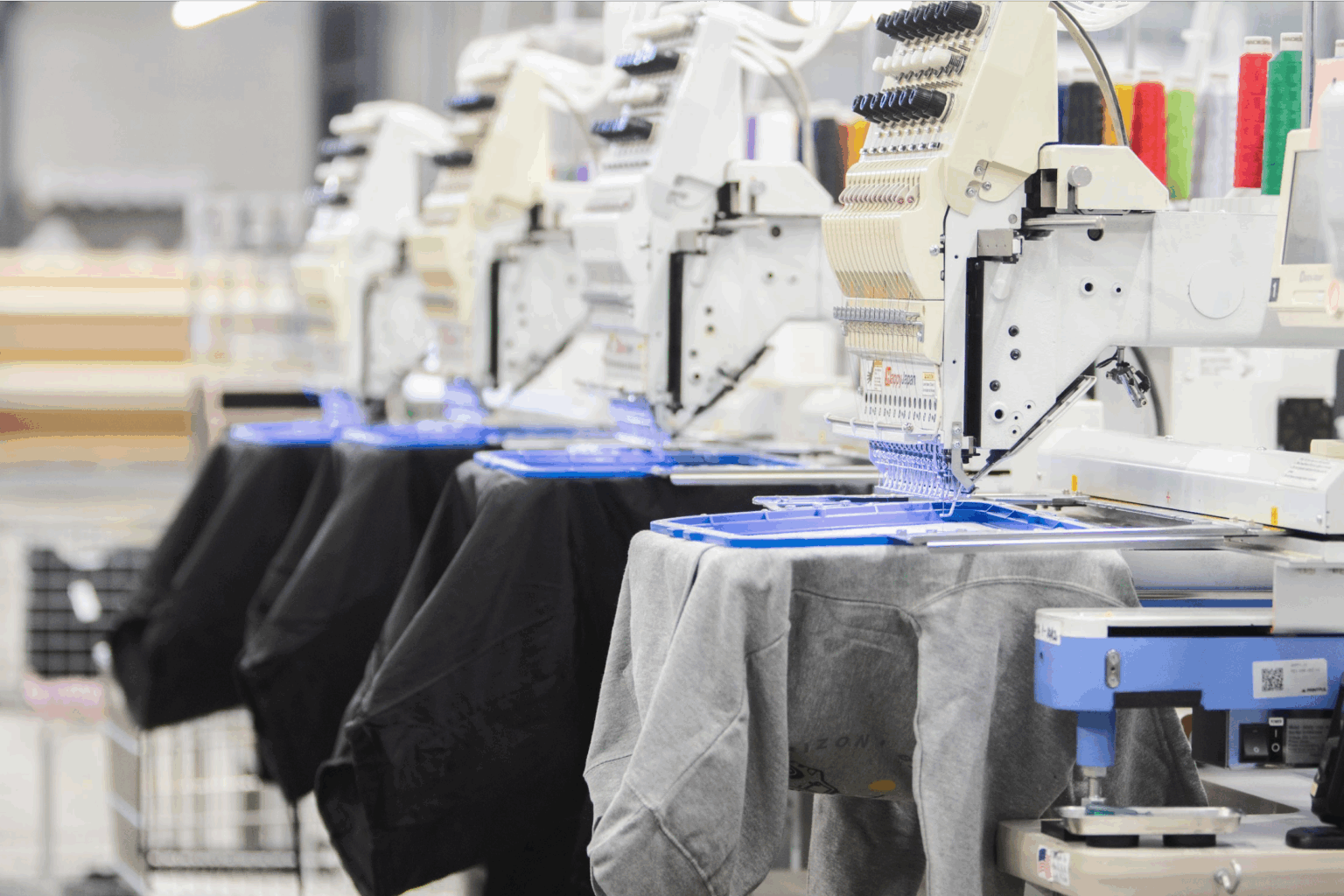Start a custom printing business with Printify
Launching a print-on-demand business in 2025? Whether it’s your first online store or you’re scaling an existing brand, choosing the right platform is where success begins.
Print-on-demand companies let you sell custom products – from t-shirts to tote bags – without holding inventory. Items are made to order, so you avoid upfront costs when starting.
The best print providers offer fast shipping times, low shipping costs, and a wide selection of in-demand products to help maximize your profit margins. But not all printing partners are equal.
To help you choose, we’ve rounded up 12 of the best print-on-demand companies for 2025. This list compares each platform’s global shipping capabilities, integration options, product range, print-on-demand business tools, and the overall value of its business model.
The 12 best print-on-demand companies in 2025
- Printify
- Printful
- SPOD
- Redbubble
- JetPrint
- Gelato
- Apliiq
- Spreadshirt
- Teelaunch
- Gooten
- Zazzle
- Lulu xPress
1. Printify
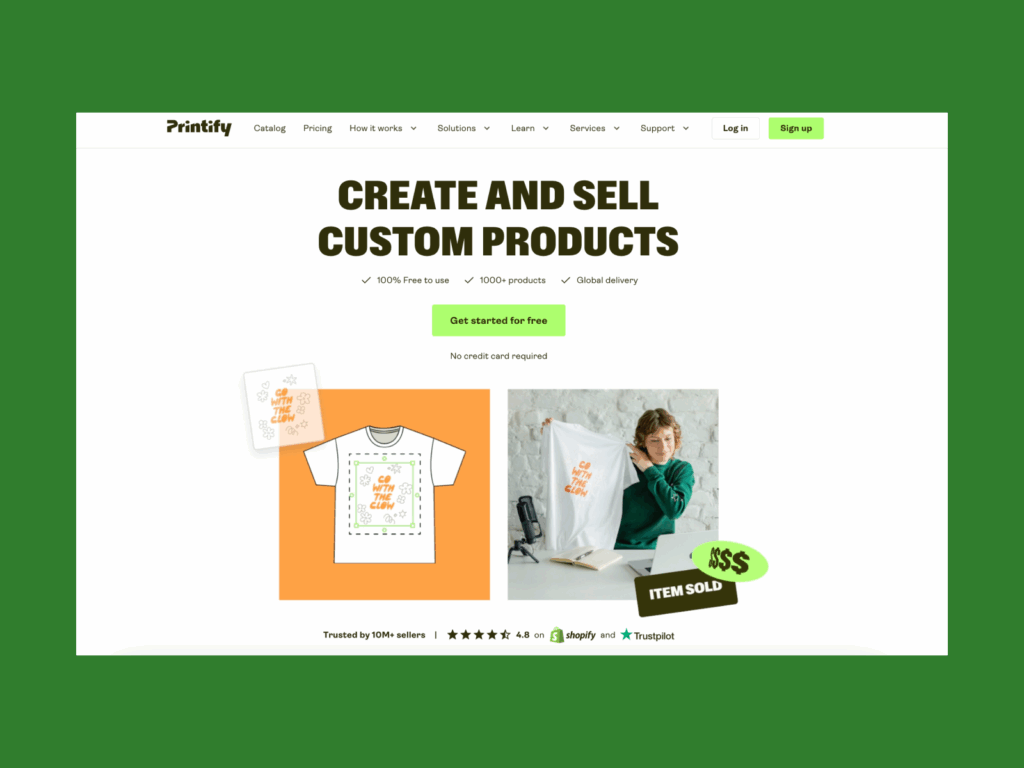
- Pricing: Free. Printify also offers two paid plans: Premium ($29/mo) and Enterprise (custom pricing), which offer up to 20% off on every product.
- Shipping: Printify works with printing partners in the US, UK, Australia, Canada, Europe, and China, saving you shipping costs. Most orders leave the printing facilities within 2-7 business days of order submission.
- Integrations: Major eCommerce platforms and marketplaces like Shopify, Wix, eBay, WooCommerce, BigCommerce, Etsy, Walmart, Squarespace, and PrestaShop. You can also integrate with Printify API for a custom solution.
- Product category highlights:
- Bella+Canvas 3001 and Gildan 5000 t-shirts
- Hoodies and other apparel for children
- Accessories like hats, backpacks, custom tote bags, and footwear
- Home decor items, pet accessories
- Best for: Individuals with varying experience levels, from beginners and skilled merchants to those who want to personalize their products.
Unlike other print-on-demand companies, Printify lets merchants choose their Print Providers based on location, shipping speed, and fulfillment costs.
The Printify Catalog has 1,300+ products and a free Product Creator that lets artists and creatives design their products in the app. Upload ready-made designs, add creative fonts with the Text Editor, or use Shutterstock integration to browse millions of low-cost images.
Printify offers direct-to-garment printing (DTG), all-over printing (AOP), direct-to-film (DTF), and embroidery. It also includes other custom branding options such as packaging inserts. Merchants set their own prices and keep higher profit margins compared to most platforms.
Start a POD business with Printify
Sign up with Printify and create your print-on-demand business without investment or bulk inventory. Start selling custom products worldwide.
2. Printful
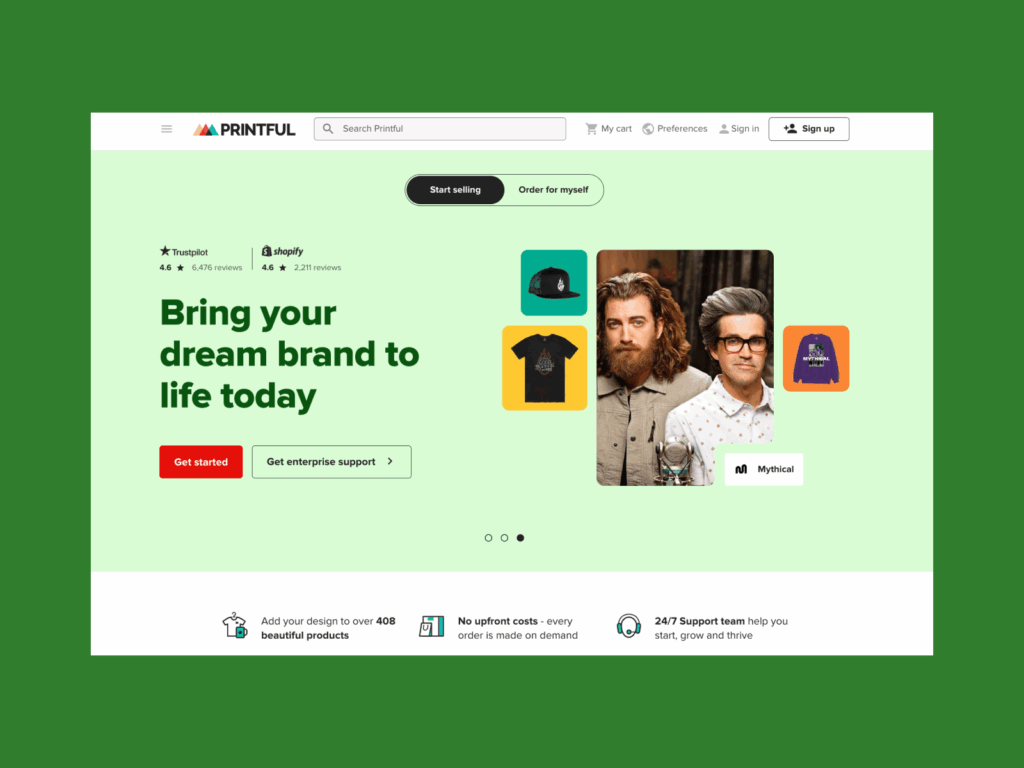
- Pricing: Printful offers a free version and a paid plan – Printful Growth ($24.99/mo).
- Shipping: Printed products are ready to leave the facility within 2-5 business days from their US, Mexico, or Europe fulfillment centers, implementing cost-effective shipping.
- Integrations: Print-on-demand marketplaces and platforms like Shopify, Etsy, Wix, WooCommerce, Squarespace, Webflow, Ecwid, PrestaShop, BigCommerce, Amazon, and eBay.
- Product category highlights: 400+ Print-on-demand products, like men’s and women’s t-shirts and other clothing, kidswear, and accessories.
- Best for: Brand builders who want to develop custom merchandise for their eCommerce store or business enterprise.
Printful is one of the most established print-on-demand websites, offering a wide selection of print-on-demand products with strong branding tools for online sellers.
Known for its in-house production, Printful controls much of its product quality and fulfillment, rather than relying solely on third-party print providers. This setup gives it more consistency and flexibility across printing options.
Printful also offers warehousing fulfillment, storing your non-Printful products and fulfilling your orders.
For added value, Printful offers product photography services, helping merchants create professional branding assets. Create custom branding through inside labels, packing inserts, and other packaging extras.
3. SPOD

- Pricing: Free to join and no setup costs.
- Shipping: SPOD has factories in the US and Europe, and ships within 48 hours of placing the order.
- Integrations: SPOD integrates best with Shopify. They also offer WooCommerce, Squarespace, and Magento. Order Desk allows integration with eBay, Etsy, and Amazon. SPOD API is also available.
- Product category highlights: Adult and children’s clothing, workwear, pajamas, and accessories such as phone cases, backpacks, stickers, and buttons.
- Best for: Individuals and on-demand businesses who need fast turnaround. Guaranteed 48-hour (or faster) fulfillment.
SPOD is built for speed – all orders are fulfilled within 48 hours. It’s an external app that charges for the order value and shipping costs, depending on the delivery type (standard, premium, or express) and the product value.
It’s also good for non-designers, as they offer 50K+ free designs to use on print-on-demand products.
4. Redbubble
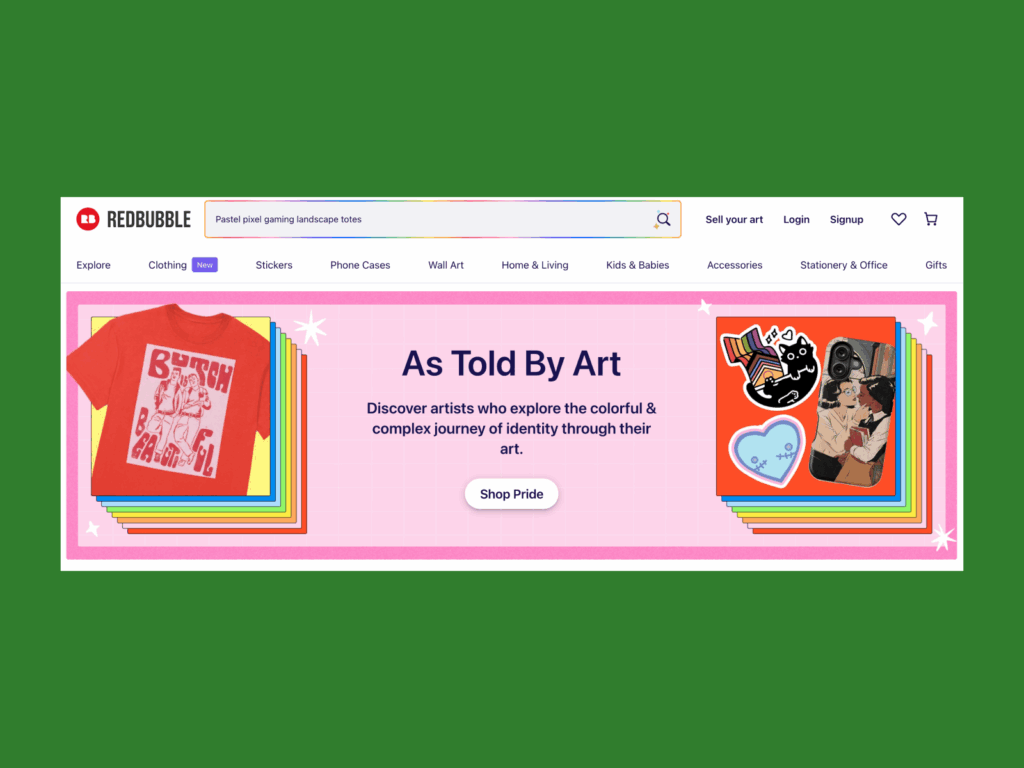
- Pricing: Redbubble is free.
- Shipping: Ships from third-party printers in Australia, Canada, the Czech Republic, France, Germany, Italy, the Netherlands, Spain, the UK, and the US – based on delivery location and product type. Redbubble offers standard and priority shipping at an additional cost.
- Integrations: Because Redbubble is a marketplace and not an eCommerce platform, they don’t offer integrations; instead, customers buy products straight from their website.
- Product category highlights: Everything from custom apparel, such as t-shirts and accessories, to phone cases, stickers, and more.
- Best for: Artists and creatives who don’t want to build a website or open their own store. It’s also great for newbies, as the site is fairly easy to use.
This print-on-demand company doubles as a marketplace – you don’t need your own website, but you get to keep your cut of the profits. On the downside, there are no options for custom branding.
The designer receives an “artist margin” of 10-30% of the purchase price.
Buyers don’t purchase from you directly – they buy Redbubble products with your custom designs. Redbubble keeps all customer information and contact details.
5. JetPrint
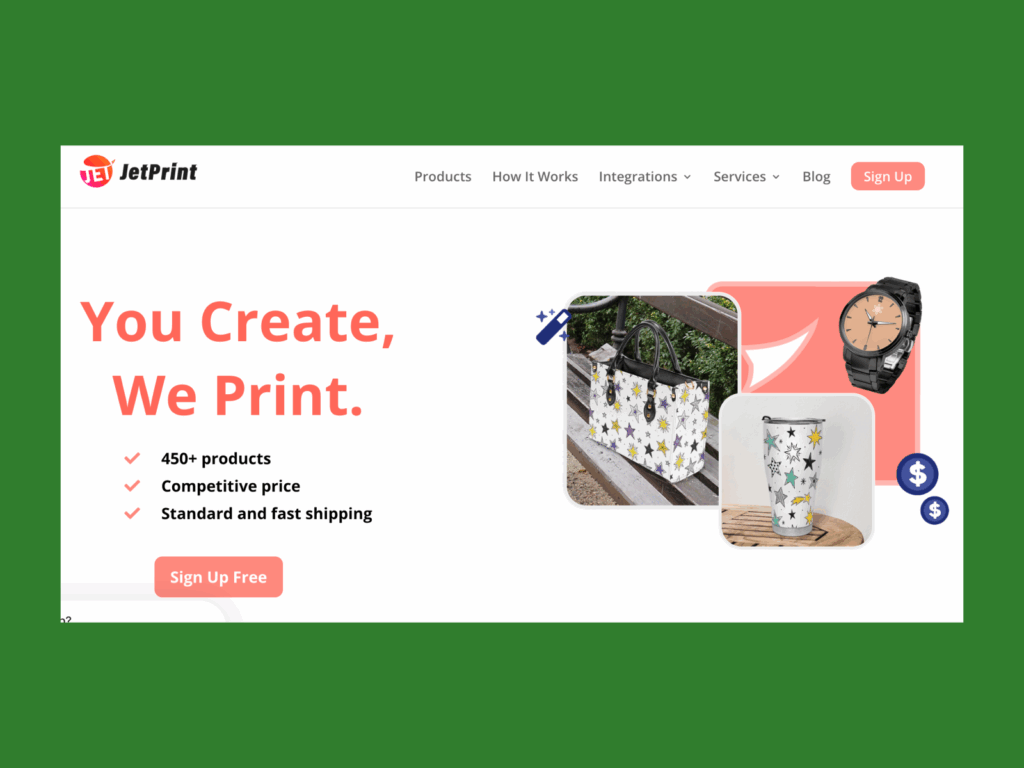
- Pricing: JetPrint is free.
- Shipping: All orders are air-freighted from China with guaranteed 3-day production and 7-day global express delivery.
- Integrations: Shopify and WooCommerce.
- Product category highlights: 400+ apparel, shoes, watches, tapestries, bags, and more.
- Best for: Creating unique custom rugs, watches, tote bags, and shoes using direct-to-garment, screen printing, sublimation, and heat-transfer techniques.
JetPrint makes POD profitable, thanks to its geography. All products are made and printed in China.
JetPrint has a simple mockup generator for uploading and placing designs onto products. It stands out from other print-on-demand services by offering a wide selection of shoes and sneakers.
JetPrint is well-rated on the Shopify App Store, making them a trustworthy print-on-demand service.
6. Gelato
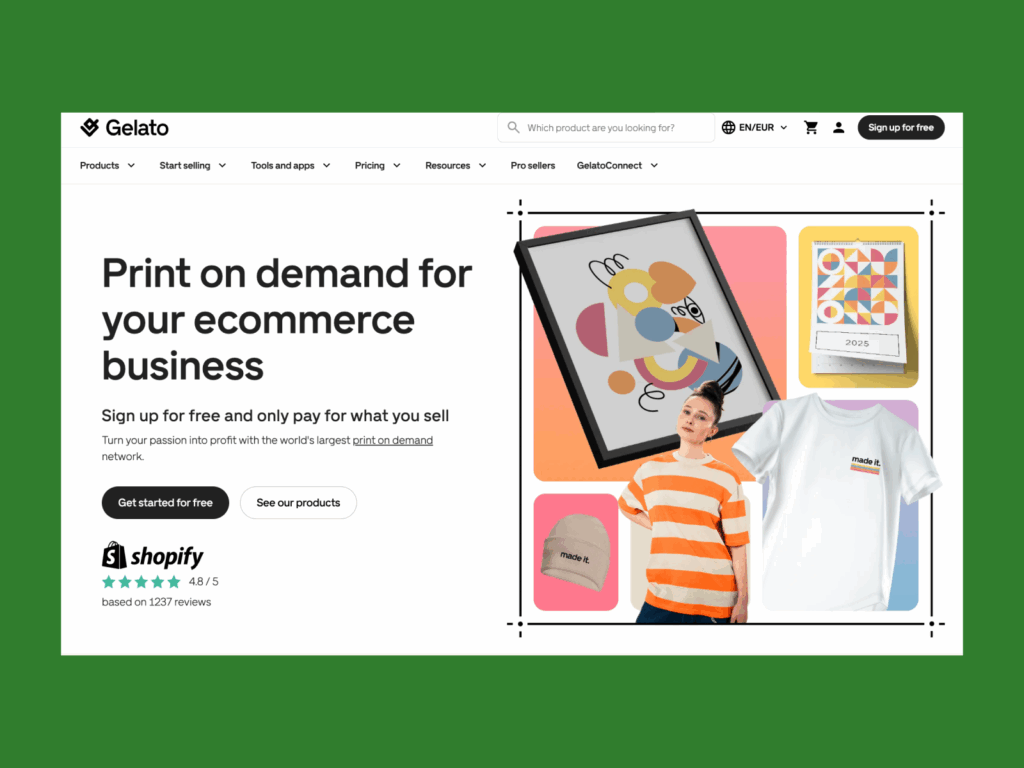
- Pricing: Gelato offers four pricing tiers: free, Gelato+ ($25/mo or $249/year), Gelato+ Gold ($129/mo or $1285/year), or a custom pricing Platinum model.
- Shipping: Gelato uses a global network of printers, so items are fulfilled as close to your customer as possible. Depending on the subscription type, they offer 20-25% shipping discounts to paid subscribers.
- Integrations: Etsy, Shopify, WooCommerce, BigCommerce, Wix, and Gelato API.
- Product category highlights: Wall art – posters, canvases, acrylic, aluminum, wood prints, calendars, and cards. Basic apparel items like t-shirts, hoodies, and tank tops are also available.
- Best for: Sellers focused on high-quality print-on-demand wall art and sustainability. Gelato encourages on-demand production to reduce waste.
Gelato is a print-on-demand platform that uses third-party printing services. It features an easy-to-use product editor and integrates with Canva for ordering straight from the app.
Shopify users can customize products during checkout. Gelato also supports manual order entry – no online store required.
7. Apliiq
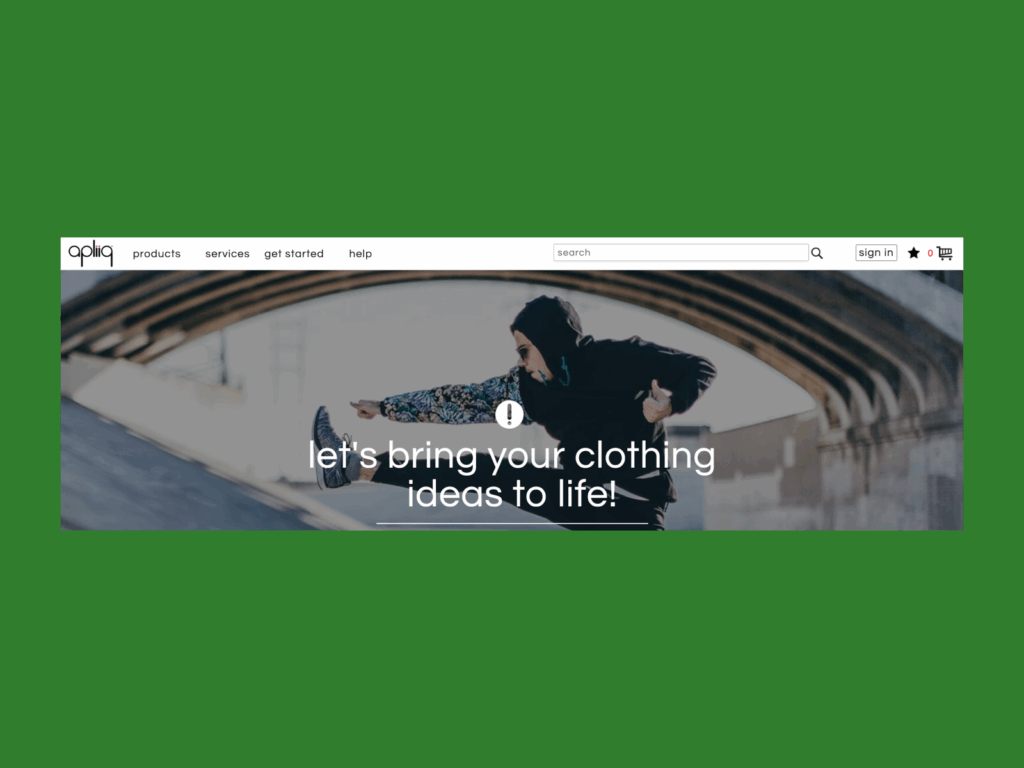
- Pricing: Apliiq is free.
- Shipping: Apliiq provides different shipping options, including international shipping to 150+ countries. They ship from two US warehouses located in LA and Philadelphia.
- Integrations: Shopify and WooCommerce. The Apliiq website also doubles as a marketplace.
- Product category highlights: Apliiq specializes in streetwear – hoodies, t-shirts, hats, pants, jackets, kidswear, and patches. They encourage merchants to work with their artists to design clothing and labels.
- Best for: Building a branded streetwear line with artist-driven customization.
This print-on-demand service offers diverse printing methods: digital printing, screen printing, embroidery, and appliqué (create your design from fabric and stitch it to custom products).
All Apliiq’s printing techniques are environmentally friendly – non-toxic, vegan-friendly, organic, non-hazardous, and biodegradable.
You have various customization options, including custom clothing tags, custom packaging, and packaging slips. However, these are only available if you have 250+ orders per month.
8. Spreadshirt
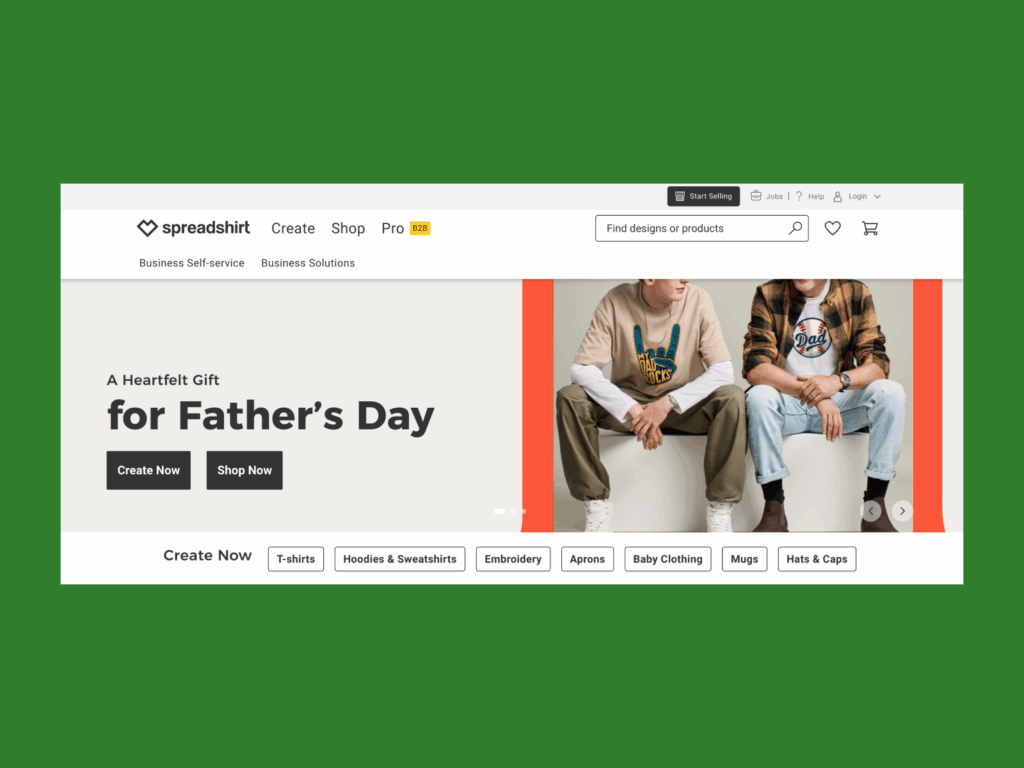
- Pricing: Free to create an account and start designing; no monthly fee. Base price for each product, as well as additional costs for customization.
- Shipping: Spreadshirt offers international shipping. The cost depends on the destination and package weight. The company’s website also has a delivery estimator.
- Integrations: Spreadshirt integrates with popular eCommerce platforms such as Shopify, Wix, Etsy, and WooCommerce, and social media platforms like Facebook and Instagram.
- Product category highlights: T-shirts and other clothing and accessories for all ages, home and living items, and stickers.
- Best for: Artists and designers who want to monetize their designs with online sales.
Spreadshirt is a print-on-demand company that lets users create and sell custom clothing and accessories. Upload designs, choose products, and sell them on the Spreadshirt marketplace or through their print-on-demand store (Spreadshop).
This print-on-demand company has a partner program that lets businesses and organizations create custom merchandise for their employees or members.
9. Teelaunch
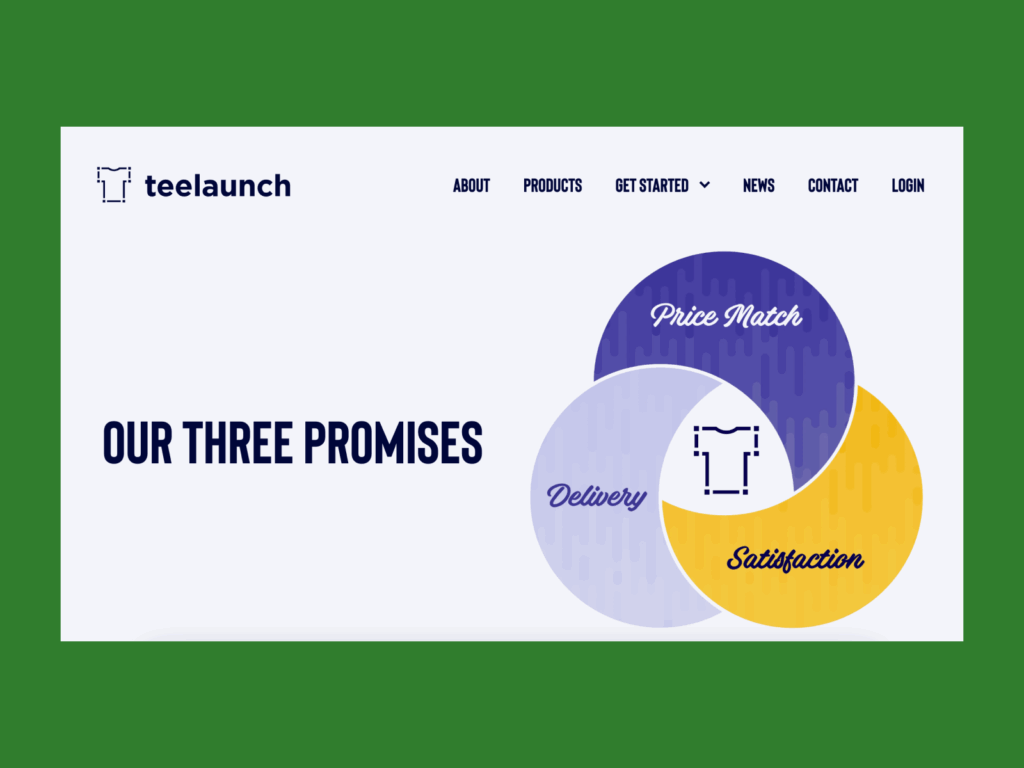
- Pricing: Teelaunch is free, with a base price for all custom products and additional customization costs.
- Shipping: Teelaunch provides international shipping. Printing facilities in the US, Europe, and Asia offer quick turnaround and low shipping costs.
- Integrations: eCommerce platforms and print-on-demand marketplaces like Shopify, Etsy, WooCommerce, BigCommerce, and API.
- Product category highlights: Apparel (t-shirts, hoodies), accessories, drinkware, home goods, jewelry, kitchenware, and pet products.
- Best for: Entrepreneurs offering unique, giftable products and looking for low-effort branding.
Teelaunch offers print-on-demand services, letting users create and sell high-quality products under their own brand.
Teelaunch has a library of pre-made, customizable designs. The company offers various customization options, including adding text and images to products.
Teelaunch offers branded packing slips and labels, helping sellers deliver a more personalized customer experience.
10. Gooten
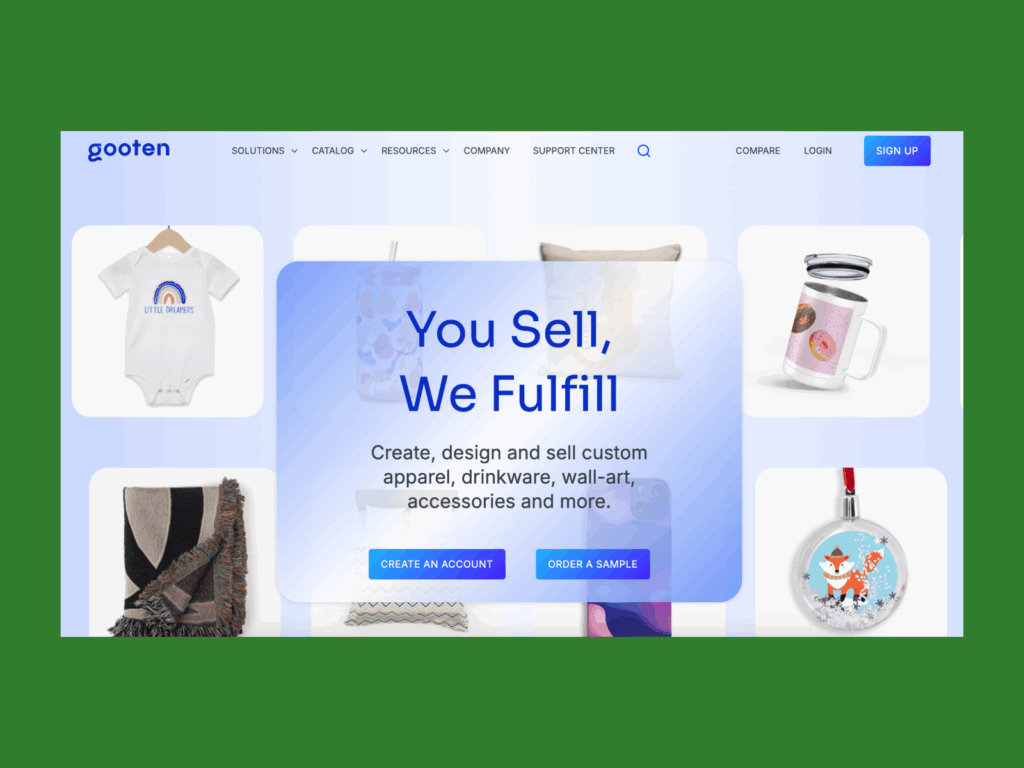
- Pricing: Gooten is free.
- Shipping: Global fulfillment by hundreds of third-party manufacturers. Shipping costs are calculated based on the customer’s location and delivery method.
- Integrations: BigCommerce, Shopify, Etsy, WooCommerce, and API plugin. Also manual one-off orders.
- Product category highlights: 150+ products, such as t-shirts, hoodies, leggings and other apparel, bandanas, notepads, blankets, bags, custom drinkware, and more.
- Best for: New sellers who want a simple interface and an easy-to-grasp product range
Gooten is user-friendly and offers a limited yet high-quality custom goods to sell under your brand, primarily to shoppers in the US. It partners with vetted print providers and provides reliable support.
They also launched the VIM (Very Important Merchant) loyalty program in 2020, the first of its kind in the print-on-demand industry. It’s recognized as a reliable option for scaling brands.
11. Zazzle
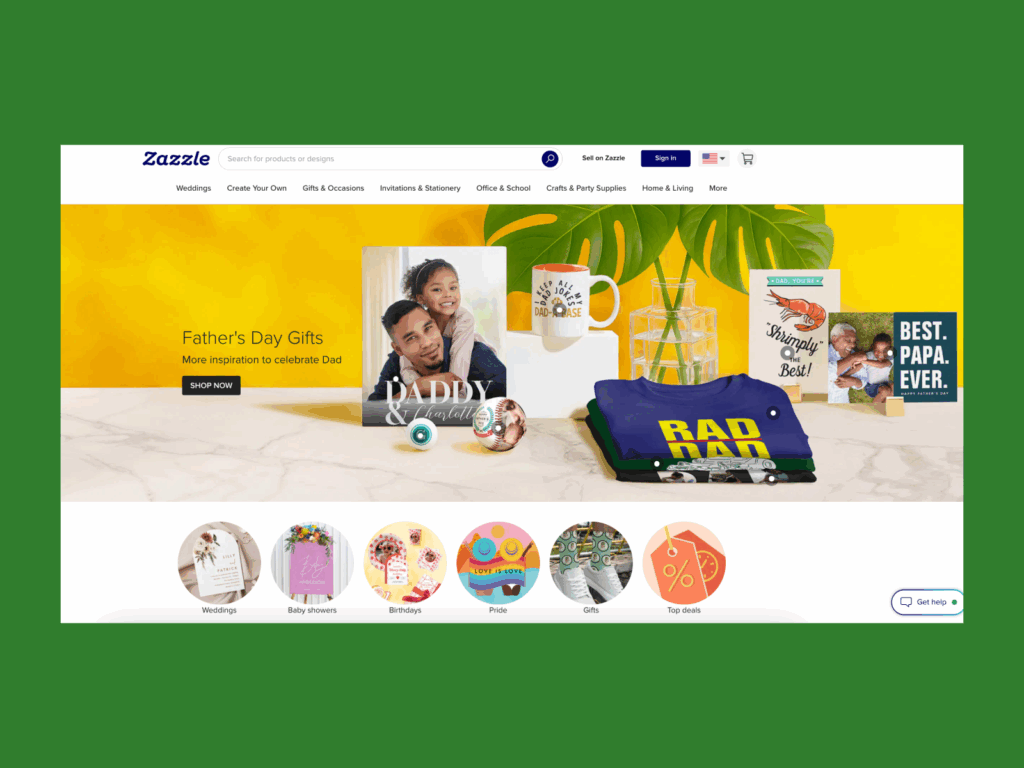
- Pricing: Signing up is free. For additional benefits, get Zazzle Plus ($19.95/year) or Zazzle Plus Premium ($49.95/year).
- Shipping: Products are produced in the US and shipped domestically and internationally. Most orders are fulfilled from San Jose, California. Find shipping costs and times here.
- Integrations: Zazzle doesn’t integrate with any platforms or marketplaces.
- Product category highlights: 1300+ Products, from apparel and accessories to home goods, office items, and digital downloads.
- Best for: Those who need a wide selection of customization possibilities and want to sell their designs online.
Zazzle is a popular print-on-demand service thanks to its massive product selection. It allows you to sell tangible goods and digital products. Sellers set their own royalty rates and earn income as Zazzle Creators.
Printing options include direct-to-garment, engraving, embroidery, sublimation, screen printing, and heat transfer.
Zazzle’s setup includes a template system, royalty settings, and product tagging, which is less beginner-friendly. But once your store is set up, selling is automated and low-maintenance.
12. Lulu xPress
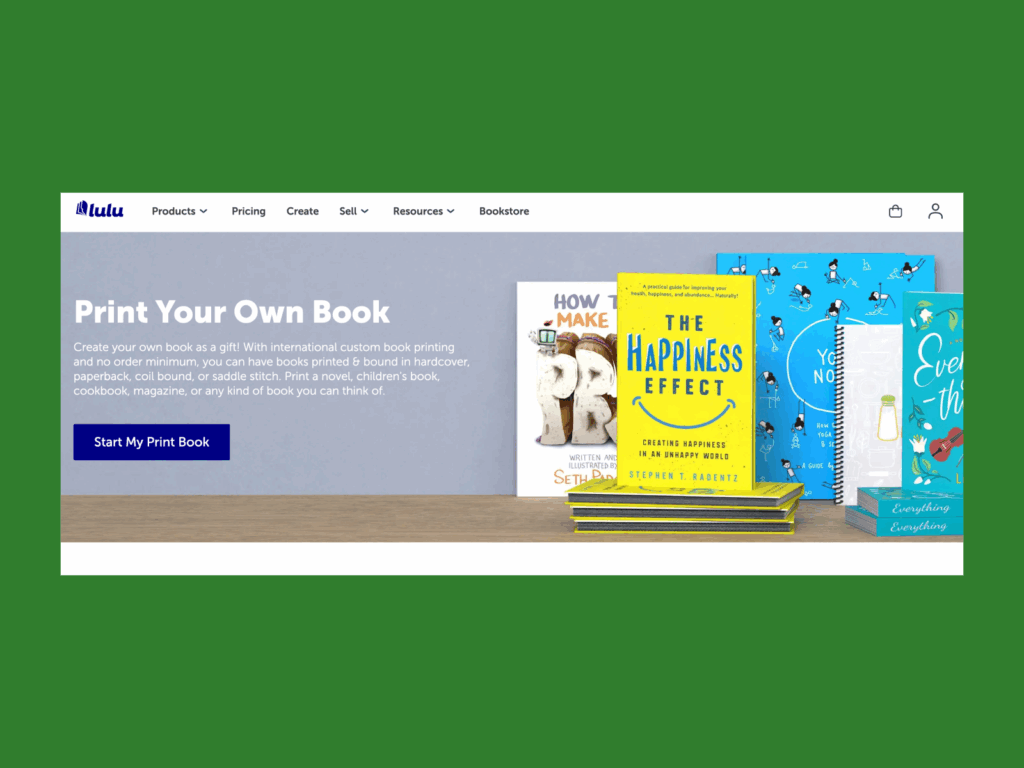
- Pricing: Signing up is free. Use their pricing calculator for accurate product prices and shipping rates. Bulk discounts available.
- Shipping: Delivers within 3-5 business days worldwide from the US, Canada, Europe, or the UK.
- Integrations: Shopify.
- Product category highlights: Magazines, print books, comic books, and calendars.
- Best for: Authors, illustrators, and creatives who want to earn money by self-publishing products such as books or calendars.
Lulu xPress differs from other print-on-demand platforms with self-publishing for customizable print products like books, magazines, calendars, and comic books. It’s a good choice for writers, photographers, and creatives who want to sell their own books, magazines, calendars, and more.
It lets you transform digital products into physical goods. Lulu xPress distributes printed books to Amazon, the Ingram network, Barnes & Noble, and other channels, but they take a 50-60% distribution fee off the listing price.
FAQ
Printfy and Printful rank among the top print-on-demand companies due to their unparalleled integration features, design tools, and huge range of quality products for scaling any business.
Printify connects sellers with 90+ Print Providers, offering competitive pricing, wide product quality options, and streamlined order fulfillment. It’s one of the best print-on-demand companies for Etsy and supports custom designs with a user-friendly interface and a massive global network.
Printful stands out with premium white label products, consistent customer satisfaction, and fast global shipping. As one of the best print-on-demand sites for Shopify, it’s great for creators wanting full control over branding and professional presentation.
Yes, it’s profitable. With low risk, automated order fulfillment, and no inventory or minimum orders, POD companies let you earn by selling white-label products without upfront investment.
Since print-on-demand websites only charge for the products you sell, the model lets merchants grow their business while receiving a profit based on their retail margins.
Long-term success and profit still require investing time in market research, design, and brand building. But landing a profit with POD doesn’t require taking risks or losing money.
Choose your print-on-demand company wisely
If you’re ready to start selling your own designs on amazing products, there are multiple excellent print-on-demand companies with different offers and infrastructure.
When choosing your print-on-demand provider – whether it’s Printify, with its range of products and amazing Product Creator, or Printful for building a brand with a wide-reaching in-house network – consider your needs for flexibility, reliability, and quality.
How much will you spend on subscription and transaction fees? How quickly do they ship the printed products? Do they offer only the best quality products and services?
Decide by weighing all the pros and cons based on your goals. There’s something for everyone in this list of print-on-demand companies. Take your pick and start your online business today.
